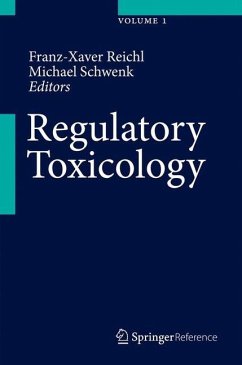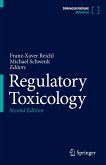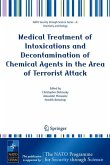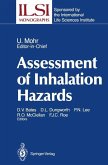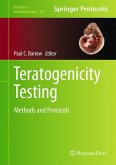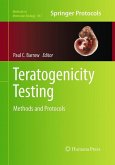Regulatory Toxicology
Herausgegeben:Reichl, Franz-Xaver; Schwenk, Michael
Regulatory Toxicology
Herausgegeben:Reichl, Franz-Xaver; Schwenk, Michael
- Gebundenes Buch
- Merkliste
- Auf die Merkliste
- Bewerten Bewerten
- Teilen
- Produkt teilen
- Produkterinnerung
- Produkterinnerung
This book will be written by experts for professionals, scientists and all those involved in toxicological data generation and decision-making. It is the updated and expanded version of a monograph published in German in 2004.Chemical safety is regulated on various levels including production, storage, transport, handling, disposal or labelling. This book deals comprehensively with the safety-ensuring methods and concepts employed by regulatory agencies, industry and academics.Toxicologists use experimental and scientific approaches for data collection, e.g. about chemical hazards,…mehr
Andere Kunden interessierten sich auch für
![Regulatory Toxicology Regulatory Toxicology]() Regulatory Toxicology628,99 €
Regulatory Toxicology628,99 €![Medical Treatment of Intoxications and Decontamination of Chemical Agents in the Area of Terrorist Attack Medical Treatment of Intoxications and Decontamination of Chemical Agents in the Area of Terrorist Attack]() Christophor Dishovsky / Alexander Pivovarov / Hendrik Benschop (eds.)Medical Treatment of Intoxications and Decontamination of Chemical Agents in the Area of Terrorist Attack77,99 €
Christophor Dishovsky / Alexander Pivovarov / Hendrik Benschop (eds.)Medical Treatment of Intoxications and Decontamination of Chemical Agents in the Area of Terrorist Attack77,99 €![Assessment of Inhalation Hazards Assessment of Inhalation Hazards]() Assessment of Inhalation Hazards77,99 €
Assessment of Inhalation Hazards77,99 €![Teratogenicity Testing Teratogenicity Testing]() Teratogenicity Testing148,99 €
Teratogenicity Testing148,99 €![Modelling the Toxicity of Nanoparticles Modelling the Toxicity of Nanoparticles]() Modelling the Toxicity of Nanoparticles110,99 €
Modelling the Toxicity of Nanoparticles110,99 €![Teratogenicity Testing Teratogenicity Testing]() Teratogenicity Testing122,99 €
Teratogenicity Testing122,99 €![Chemical Mixtures and Combined Chemical and Nonchemical Stressors Chemical Mixtures and Combined Chemical and Nonchemical Stressors]() Chemical Mixtures and Combined Chemical and Nonchemical Stressors147,99 €
Chemical Mixtures and Combined Chemical and Nonchemical Stressors147,99 €-
-
-
This book will be written by experts for professionals, scientists and all those involved in toxicological data generation and decision-making. It is the updated and expanded version of a monograph published in German in 2004.Chemical safety is regulated on various levels including production, storage, transport, handling, disposal or labelling. This book deals comprehensively with the safety-ensuring methods and concepts employed by regulatory agencies, industry and academics.Toxicologists use experimental and scientific approaches for data collection, e.g. about chemical hazards, physicochemical features or toxicokinetics. The respective experimental methods are described in the book. Toxicologists also deal with much insecurity in the exposure and effect scenarios during risk assessment. To overcome these, they have different extrapolation methods and estimation procedures at their disposal.The book describes these methods in an accessible manner. Differing concepts from one regulation area to another are also covered. Reasons and consequences become evident when reading the book. Altogether, the book Regulatory Toxicology will serve as an excellent reference.
Produktdetails
- Produktdetails
- Verlag: Springer / Springer Berlin Heidelberg / Springer, Berlin
- Artikelnr. des Verlages: 978-3-642-35373-4
- 2014
- Seitenzahl: 996
- Erscheinungstermin: 27. März 2014
- Englisch
- Abmessung: 241mm x 160mm x 65mm
- Gewicht: 1750g
- ISBN-13: 9783642353734
- ISBN-10: 3642353738
- Artikelnr.: 36713509
- Verlag: Springer / Springer Berlin Heidelberg / Springer, Berlin
- Artikelnr. des Verlages: 978-3-642-35373-4
- 2014
- Seitenzahl: 996
- Erscheinungstermin: 27. März 2014
- Englisch
- Abmessung: 241mm x 160mm x 65mm
- Gewicht: 1750g
- ISBN-13: 9783642353734
- ISBN-10: 3642353738
- Artikelnr.: 36713509
Franz-Xaver Reichl studied Microbiology and Medicine in Munich, Germany. He is Head of the Department of Dental Toxicology at the Department of Operative/Restorative Dentistry, Periodontology and Pedodontics, LMU Munich and Head of the International Advisory Centre for the toxicology and biocompatibility of dental materials. His field of research cover studies on cytotoxic, mutagenic, carcinogenic and embryotoxic effects of chemical compounds (e.g. dental materials) in human and animal cells, abrasion of composites and elution of dental composite components during the chewing situation in the chewing simulator MUC/3 and in vitro- and in vivo studies on toxicokinetic and toxicodynamic effects of chemical compounds (e.g. dental materials). He also work on studies on the pathways and on the analysis of intermediates in the metabolism of dental composite components in biological systems and risk assessments of xenobiotics (e.g. dental materials). Michael Schwenk studied Biochemistry and Medicine in Tuebingen, Germany. He then qualifiedas a toxicologist and pharmacologist and worked in universities, industry and a health agency. He initially focused on experimental cell toxicology, but later shifted to the measurement of chemical residues in humans and to study the health effects of such exposures in different populations. He was active in various national regulatory committees, advised the colleagues of the public health service of Baden-Württemberg and received practical experience in all major areas of regulatory toxicology.
Foreword.- Introduction.- Operation mode of regulatory toxicology.- Aims and institutions.- Aims and mission.- Application areas.- National and international collaboration.- Procedures and standards.- The regulatory process.- Quality assurance in regulatory toxcicology.- Toxicological risk assessment.- Methodological repertoire.- Toxicological tests.- Characterization of physicochemical parameters.- Examination of acute and chronic toxicity.- Examination of organ-toxicity and of laboratory parameters.- Specific tests for neurotox , immunotox, allergy, irritation, reprotox and carcinogenicity.- Toxicity testing in vitro.- New and future toxicological assays.- Computer-based prediction models.- Metabolism tests.- Toxicokinetic tests.- Toxicodynamic tests.- Omics.- International regulation for toxicological test procedures.- Data acquisition in humans.- Epidemiological methods.- Studies in volunteers.- Chemical analysis in toxicology (New).- Toxicostatistics and models.- Statistical evaluation methods.- Dose-response analysis, identification of threshold levels.- Extrapolation-procedures for carcinogenic and non-carcinogenic compounds.- Probabilistic methods.- Toxicodynamic models.- Toxicokinetic models.- Estimation of exposure.- Exposure analysis for indoor contaminants.- Exposure scenarios.- Use of toxiological data.- Quality criteria for primary literature.- Data-mining.- Paradigms use in risk evaluation.- Toxicological paradigms.- Do carcinogens have a threshold dose? pro and contra.- Single compounds vs combination effects.- Biomolecules vs smaller chemicals.- Sensitive humans vs average persons.- Assessment paradigmas.- Extrapolation factors and safety factors.- Background exposure vs additional exposure in human biomonitoring.- Adverse effects vs non-adverse effects.- ADI vs MOS principle.- Precaution principle vs hazard control.- Hygienic vs toxicological approaches.- Protected property and protection level.- Risk characterization and risk evaluation.- The riskconcept.- Current role of the term "risk".- Risk cycles.- Risk minimization in drug development.- Data required for risk evaluation.- Importance of physical-chemical properties.- Importance of intrinsic toxic properties.- Importance of metabolism and of mechanism of action.- Importance of the extrapolation to lower doses in risk assessment.- Importance of exposure level for risk assessment.- Risk characterization.- Risk assessment.- Elements of risk assessment.- Risk comparison.- Risk-benefit considerations.- Risk assessment in different jurisdictions.- Reach as a regulatory instrument (New).- Risk management and risk communication.- Risk management.- Purpose of risk management.- Assessment of limit values.- Deduction of limit values in different areas.- Registration and approval.- Classification and labelling.- Monitoring unwanted exposures and effects.- Restrictions and prohibitions.- Observance of susceptible population groups.- The toxicological expert report.- Risk management intoxicological emergencies.- Risk communication and participation of affected people.- Institutionalized participation.- The technique of risk communication.- Dealing with diseases that have been attributed to chemical exposures.- Addendum: tables and lists.- Checklist: Toxicological risk assessment in practice.- Glossary and risk terms.- Limit values, guideline values, tables.- Proposed additional chapters on Ethics in toxicology and expansion of the chapter dealing with Immunotoxicology.
Foreword.- Introduction.- Operation mode of regulatory toxicology.- Aims and institutions.- Aims and mission.- Application areas.- National and international collaboration.- Procedures and standards.- The regulatory process.- Quality assurance in regulatory toxcicology.- Toxicological risk assessment.- Methodological repertoire.- Toxicological tests.- Characterization of physicochemical parameters.- Examination of acute and chronic toxicity.- Examination of organ-toxicity and of laboratory parameters.- Specific tests for neurotox , immunotox, allergy, irritation, reprotox and carcinogenicity.- Toxicity testing in vitro.- New and future toxicological assays.- Computer-based prediction models.- Metabolism tests.- Toxicokinetic tests.- Toxicodynamic tests.- Omics.- International regulation for toxicological test procedures.- Data acquisition in humans.- Epidemiological methods.- Studies in volunteers.- Chemical analysis in toxicology (New).- Toxicostatistics and models.- Statistical evaluation methods.- Dose-response analysis, identification of threshold levels.- Extrapolation-procedures for carcinogenic and non-carcinogenic compounds.- Probabilistic methods.- Toxicodynamic models.- Toxicokinetic models.- Estimation of exposure.- Exposure analysis for indoor contaminants.- Exposure scenarios.- Use of toxiological data.- Quality criteria for primary literature.- Data-mining.- Paradigms use in risk evaluation.- Toxicological paradigms.- Do carcinogens have a threshold dose? pro and contra.- Single compounds vs combination effects.- Biomolecules vs smaller chemicals.- Sensitive humans vs average persons.- Assessment paradigmas.- Extrapolation factors and safety factors.- Background exposure vs additional exposure in human biomonitoring.- Adverse effects vs non-adverse effects.- ADI vs MOS principle.- Precaution principle vs hazard control.- Hygienic vs toxicological approaches.- Protected property and protection level.- Risk characterization and risk evaluation.- The riskconcept.- Current role of the term "risk".- Risk cycles.- Risk minimization in drug development.- Data required for risk evaluation.- Importance of physical-chemical properties.- Importance of intrinsic toxic properties.- Importance of metabolism and of mechanism of action.- Importance of the extrapolation to lower doses in risk assessment.- Importance of exposure level for risk assessment.- Risk characterization.- Risk assessment.- Elements of risk assessment.- Risk comparison.- Risk-benefit considerations.- Risk assessment in different jurisdictions.- Reach as a regulatory instrument (New).- Risk management and risk communication.- Risk management.- Purpose of risk management.- Assessment of limit values.- Deduction of limit values in different areas.- Registration and approval.- Classification and labelling.- Monitoring unwanted exposures and effects.- Restrictions and prohibitions.- Observance of susceptible population groups.- The toxicological expert report.- Risk management intoxicological emergencies.- Risk communication and participation of affected people.- Institutionalized participation.- The technique of risk communication.- Dealing with diseases that have been attributed to chemical exposures.- Addendum: tables and lists.- Checklist: Toxicological risk assessment in practice.- Glossary and risk terms.- Limit values, guideline values, tables.- Proposed additional chapters on Ethics in toxicology and expansion of the chapter dealing with Immunotoxicology.

